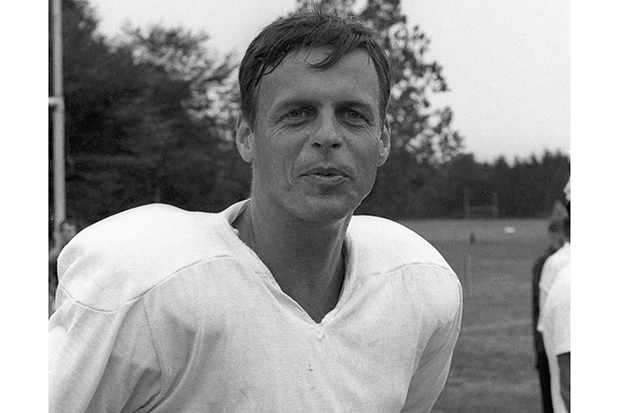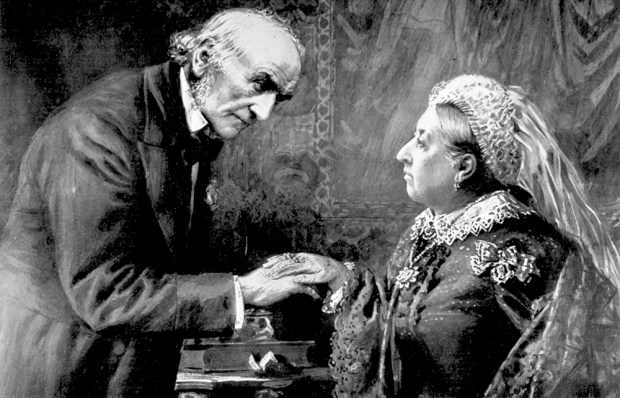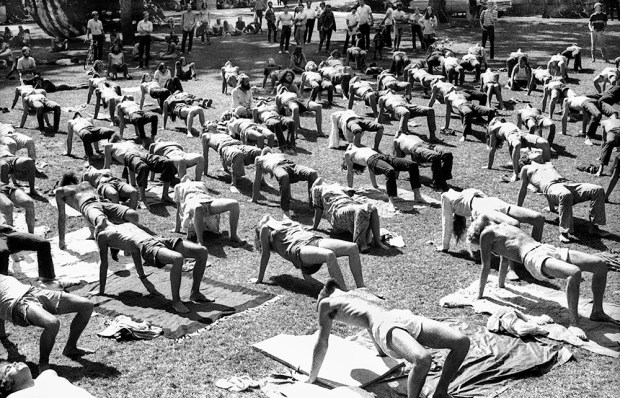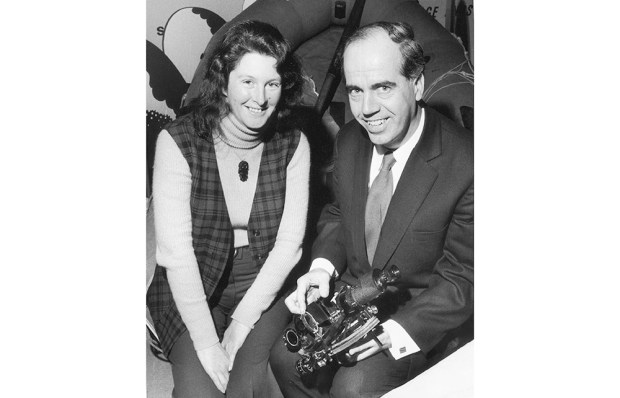I once played in something called the Writers’ World Cup. A lot of people in publishing (novelists, journalists, editors, agents) like to think that if their lives hadn’t been poisoned by books, they might have really made something of themselves — as ballplayers, among other things. This is probably one of the more pleasant delusions. The star of the tournament was a stocky bull-chested essayist who, rumour had it, used to play in some Hungarian minor league. Nobody could take the ball off him. Afterwards the writers got together in some theatre that the organisers had hired and talked for several hours in turns about the meaning of football. I guess this is what we were good at.
George Plimpton spent a large part of his writing career putting this delusion to the test. Yellow Jersey Press are reissuing several of his books of ‘participatory journalism’, as the phrase is — beginning with Out of My League, his brief experiment in major-league baseball, which gave him a taste for the whole enterprise. Writers are generally guilty of a kind of constitutional amateurism — they play for fun with lives their characters have to live for keeps. In other words, they keep up the old distinction between the gentlemen and the players. Plimpton was the classic gentleman.
His family money came from publishing, but there were fancy connections on both sides to prominent figures of one kind or another. For years, he edited the Paris Review, whose office was staffed, as Philip Roth put it, by
young men in their late twenties and early thirties, for the most part, like [George] … from wealthy, old-line families who’d sent their sons to exclusive preparatory schools and then on to Harvard, which, in those early postwar years, as in prior decades, was mainly a bastion for educating the offspring of the socially elite.
Plimpton also spent time at the other Cambridge (in England). He was the sort of gentleman who could take a third.
All of which made him the perfect writer for a series of books about professional sports: he was old-fashioned enough to begin each project with just the right amount of delusion, that the gentleman, after all, can still compete with the players. ‘There is something wrong with you,’ a friend tells George, before he signs up for training camp with the Detroit Lions.
‘I may get knocked around, but I’ll be privileged — it’s a privileged position. At least for an observer. You’d be absolutely right if I were trying to be a football star.’
‘Well, I think that’s what you’ve got in mind . . .’
‘I’m an observer,’ I said stubbornly.
‘You got some sneaking idea you can make it,’ he said. ‘Don’t try to kid me.’
‘Well, what’s wrong with that?’ I said hotly. ‘After all, I’m going to be trying my best.’
George was 6’4”, lanky, a decent schoolboy athlete (he pitched for his prep school baseball team at St Bernard’s), but the narrative trajectory of each of these books is shaped by the forces that erode this delusion. It turns out, the gentleman can’t compete with the players, and learning this, somehow, feeds his own privileged sense of wonder at the talents of the players
themselves.
Out of My League grew out of an afternoon at Yankee Stadium, when he watched the great Mickey Mantle hit a home run. Plimpton had good enough seats that he could hear the pitcher afterwards cursing to himself on his return to the bullpen (‘d’ja get a load of that? That crumbum! Threw him a –’ ). In his casual aristocratic way, he asked himself, I wonder what that feels like, and in his casual aristocratic way managed to pull enough strings to find out: by persuading Sports Illustrated to fund a sideshow contest before an all-star exhibition game, in which George would pitch to each of the pros in turn.
The experience gave him a taste for this kind of hobby, and he tried his hand at professional football (the American kind), ice hockey, golf and even boxing, spending three rounds in the ring with Archie Moore. There’s a sadness inherent in the enterprise, though. To win over his editor, he told him:
James Thurber . . . once wrote that the majority of American males put themselves to sleep by striking out the batting order of the New York Yankees. That’s my fellow, you see, lying there staring at the bedroom ceiling . . . .
His editor responded that it was ‘an awful commentary on the American male — to think he has his mind on such things’.
But then he leaned in conspiratorially and confided: ‘Let me tell you what I often find myself doing in bed at three a.m… I sink these long, these incredibly long putts.’
There’s a kind of kid for whom growing up means realising you can’t play these games any more — because there are kids out there who are better, stronger, faster, smarter than you, and you’ll always lose. In that sense, Plimpton uses these books to grow up. His outing against the baseball all-stars starts out well enough (he even gets Willie Mays to ‘fly out’), but pretty soon he realises that he just doesn’t have it: his arm wears down, his mind goes, and he loses all control over his throwing motion. A manager has to step in, while George goes through what his editor at SI predictively described as ‘the sort of nightmare thing we should hope never happens to anyone we know’.
And yet Plimpton keeps trying new sports because of what ends up replacing the delusion: a vivid, first-hand, more expert sense of just how good these ballplayers are. Out of My League takes up an afternoon, but in Paper Lion, his experiment in professional football, he lasts for most of a training camp. He rooms with the guys, takes their shit, joshes back and paints a series of beautiful thumbnail sketches along the way. But he never quite loses his sense of being a gentleman among players — of being a gentleman who would rather be one of the players. Because the pros, like any professionals, have a series of skills, a set of knowledge, a shorthand for experience, which they can take for granted in each other and by way of which George recognises his exclusion. They know, and he doesn’t — and for a writer, a journalist and an editor that kind of knowledge is the thing strived for, a kind of proof of realism.
The first time he tries to take a snap from centre in a football game (naturally, he imagines himself as a quarterback), he doesn’t know who to line up under, or where to put his hands (at the base of the centre’s butt, just above the perineum). They hike the ball so hard you can hear the percussion of leather on skin across the football field. And no matter how hard he practises, he realises that ‘there was no mistaking a professional quarterback’s throw — one had the sense, seeing it come, of a projectile rather than a football’.
The simplest things, the little moves you watch a thousand times from the cheap seats in a stadium or the sofa of your TV room and never even notice, turn out to be almost impossibly difficult. Plimpton, for example, can’t turn fast enough to hand off a football to the running back; they hit the hole so hard that they’ve already gone past him by the time he offers the ball. At his big performance, in the offence-defence intra-squad scrimmage in front of a packed house in Pontiac, Michigan, the head coach lets him run five plays. Five simple plays, each of which he’s rehearsed again and again in practice. On the first, he gets knocked down by his own blocker and fumbles . . . and the afternoon goes downhill from there. The reason you’re a gentleman and not a player is that you’re not serious enough. Plimpton learns what being serious looks like and feels like.
But there’s something unenviable about that seriousness, too. Most sports-crazy kids reach a point in their lives when they realise they have outgrown their youth. The alternative to that, of course, is not to outgrow your youth. The football players in Paper Lion spend their training camp at Cranbrook Academy, a private school, and sleep in dorms and eat in cafeterias and keep or break a nightly curfew — many of them thirty-something married men, with kids of their own. The relentless public exposure of their skills and limits produces in them any number of tics and superstitions. And the competition sets them against each other, too. Old hands see in every rookie the young gun who will come to replace him, a few years later. Rookies, for their part, feel the constant weight of the old guard’s resentment as they try to break down the door. The book ends on a note of species lament: Plimpton, heading home, leaving the field for the last time, hearing ‘the long bleat from the players being whistled together by the coaches, almost one of sorrow’.
In his own way, though, Plimpton himself is an old pro, too, master of guild secrets and craft expertise. As a guy who edited a high-end literary magazine for most of his life, he learned how to make a football on the page move ‘like a projectile’, and the casual, curious, light-hearted precision of his prose is just as impressive as the way a great ball player can make the ball pop off his bat. There’s a debt to Hemingway, especially in the deadpan dialogue (the great man wrote a blurb for the first edition of Out of My League, calling it ‘the dark side of the moon of Walter Mitty’), but it isn’t obtrusive, and in fact Plimpton has gentlemanly virtues all his own. The stakes are much lower here; he’s a guy trying stuff out, and that means his gentler upper-class curiosity has room to breathe. As Roth put it in his beautiful eulogy to Plimpton in Exit, Ghost: ‘The closest [I thought] George would ever come to dying is to simulate it in an article for Sports Illustrated.’
The post A gentleman among players appeared first on The Spectator.
Got something to add? Join the discussion and comment below.
Get 10 issues for just $10
Subscribe to The Spectator Australia today for the next 10 magazine issues, plus full online access, for just $10.
You might disagree with half of it, but you’ll enjoy reading all of it. Try your first month for free, then just $2 a week for the remainder of your first year.














Comments
Don't miss out
Join the conversation with other Spectator Australia readers. Subscribe to leave a comment.
SUBSCRIBEAlready a subscriber? Log in